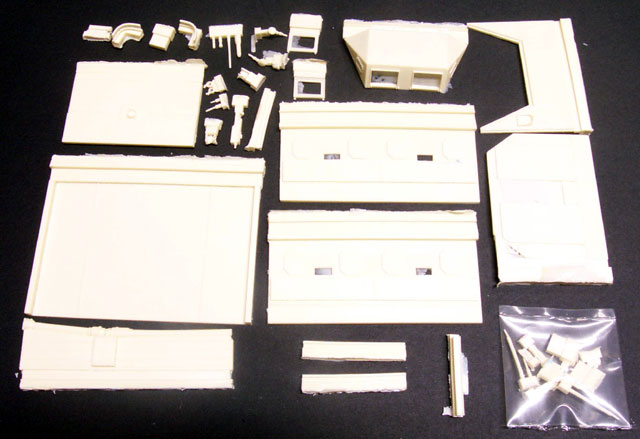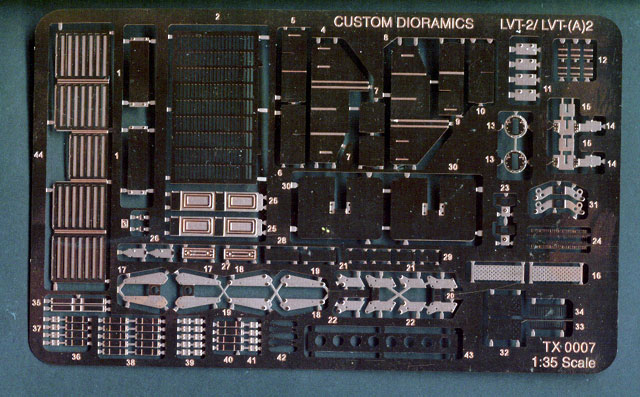| Catalogue Number: |
TX0005 and TX0007 |
| Contents and Media: |
Item TX 0005- LVT-A2 Resin and
Photo-Etched Conversion &
Item TX 0007- LVT 2 resin and Photo-Etched Conversion |
| Price: |
US$49.95 each |
| Scale: |
1/35 |
| Review Type: |
FirstLook |
| Advantages: |
Complete conversion; all
necessary parts included; a welcome release of a long neglected
workhorse of the NW and Pacific campaigns. |
| Disadvantages: |
Less than convincing
representation of M2 .50 Cal HB and the skate rail mounts; some mold
release disfigurement on one wall panel of the review sample. No
interior drivers compartment detail provided.(See text) |
| Recommendation: |
Highly Recommended |
Reviewed by Al Bowie
The LVT 2 and its follow-on armoured A2 variant were predecessors of
the famous LVT 4 Buffalo, differing only in that they had a rear mounted
engine and a centre mounted cargo well.
This centre mounted well/ troop compartment was a tactical liability
which exposed debussing troops to enemy fire whilst they alighted the
vehicle over the side. For a soldier carrying a heavy battle load it also
exposed him to the risk of ankle, leg or even back injury. The original
vehicle the LVT 2 was also relatively unarmoured with large windscreens,
doubling as escape hatches, provided for the crew. This was alleviated in
the A2 with the replacement by an armoured cabin with a drivers visor and
overhead escape hatches.
Both vehicles were armed with .50 cal and .30 cal type machine guns,
depending on the vehcile's role.
The cargo well had two skate rails on which the MGs were mounted
allowing the gunner a greater field of fire than a static pintle.
Despite its shortcomings the LVT 2/A2's served from 1943 right up to
the end of the war, despite the introduction of the later LVT 4. They were
used by the US Marines and Army in Pacific (sometimes sporting colourful
three tone schemes) and by the British and US Armies in NW Europe. This
should give the modeller a variety of schemes and configurations to model.
Good reference is available making the modellers task easier.
The LVT-2/2A
Conversions
Modellers of US & Commonwealth armour (and softskins, as the LVT is
technically a softskin) have been presented with a long neglected
subject available at a reasonable price with these latest releases from
the Trakz (VLS) stable.
The conversions are designed to fit the recent Italeri LVT (A)1 (and
Revell clone) release.
Both kits are almost identical. The difference is limited to the style
of cabin. As such, the comments in this review are applicable to both
vehicles.

The kits comprise a number of major resin assemblies which make up the
cargo well (with its prominent drive shaft running down the middle and
skate rails), the cabin, front deck, single .50c al and two .30 cals. Added
to this is a substantial PE fret providing the ventilated radiator cover
(?) the rear wall of the cargo well, gun fittings and shields, periscope
mounts, light covers, the mounting points for the skate rails and a
welcome addition of replacement rear vanes which are overscale in the actual kit.
Construction
Construction begins with cutting out the centre of the hull walls and
replacing them with resin items. The forward and rear bulkheads,
driveshaft and floor are added forming the substantial cargo well. The kit
deck is now added (with a replacement of the forward deck for the LVT 2)
and the rear vanes are replaced by PE.

This is the stage that we are presented with the only difficult
looking part of the project - the skate rails and mounts. These are in 5
parts of resin with PE mounts for the rear rail assembly and a single resin piece
with photo etched parts for the forward rail. Next is the cabin and hatches etc followed by
the fine details and MG's. The resin has substantial mounting plugs and
will require careful seperation from these to avoid damaging detail You will definitely need a few hours and the
Motor Tool for
this one!
The upside of this substantial plus is that there was minimal warpage in any of these
large parts. Very little flash was apparent and cleanup will not be too bad.
Accuracy and
Impressions
Not being a vernier wielder or rivet counter (I'll leave that to the
noted experts in this field), and not having the time to lay the kit
against plans, the kit matches the photos of the real thing well
and appears complete with no obvious omissions. I cannot comment on fit,
but the dry fitting I have done so far has been trouble free.
I was, however, disappointed with a few items in these kits.
The .50 cal, whilst appearing
well detailed, bears little similarity to the real weapon in the open
breech area (I recommend closing the feed cover). I was also disappointed
with the Ammo cans provided which are a block of resin around which you wrap a
lovely PE skin. It would have been much better if they had molded
the ammo belt into the top of the can instead of giving an unimpressive
flat piece of photo etch. After seeing the latest Verlinden .50 cal you will understand how far behind this one is.
Also, the pintle
socket of the skate rail travelling mount appears to be quite underscale compared to photos (It could be my
eyesight at fault here however). On on of my samples, the port-side cargo well wall had
obviously not separated completely from the mold and will require a bit of
corrective surgery to fix. It should be noted that this is quite a small
imperfection and probably a one
off; and the fault was not duplicated in the other conversion.
The final area which is a bit of a let down is relevant more so to the LVT
with its large front windscreen. Absolutely no interior of the crew
compartment is supplied which will be very obvious if modelling a variant
with no improvised armour sheeting over these.
This is a well executed conversion offering a neglected but important
subject. However, it is not recommended as a first conversion.
The lack of the crew compartment (even rudimentary) on the LVT 2
conversion is disappointing.
Despite the niggles noted above I was quite impressed with these
releases and already have my variant planned and awaiting construction. I
would recommend this for any modeller with limited experience working with
resin conversions and photo-etch.
Rating 4 out of 5!
Highly Recommended.
-
STUART - A history of the
American Light Tank VOl 1. R.P. Hunnicutt by Presidio Press. Whilst not
devoted to the LVT has a section on them.
-
Marines at
War - Ian Dear. IAN ALLEN LTD ISBN 0-7110-1147-8. Has
good photographic coverage of US and UK vehicles (particularly the
Walcheren operations).
-
US AMTRACS and AMPHIBIANS
- Steve Zaloga and George Balin. CONCORD Armour at War Series No 7032.
Good Photographic coverage of All users. Brief Historical notes
-
AMTRACS in action part
1 Armor Number 31- J Mesko. SQUADRON SIGNAL
Publications
-
BRITSH TANKS of WWII
(2) - David Fletcher. CONCORD Armour at War Series No
7027. Excellent photos of British vehicles in NW Europe.
-
ACROSS THE REEF ,
The Amphibious Tracked Vehicle at War - Victor Croizat (Col
USMC retd). BLANDFORD1989 ISBN 0-7137-1894-3
Thanks to VLS for
the review samples
These and other VLS
products may be viewed at the
VLS Website

HyperScale is proudly supported by
Squadron.com
Review Copyright © 2002 by
Al Bowie
Page Created 21 June, 2002
Last updated 22 July, 2003
Back to HyperScale
Main Page
Back to Reviews
Page
|
Home | What's
New | Features
| Gallery |
Reviews | Reference
| Forum
| Search